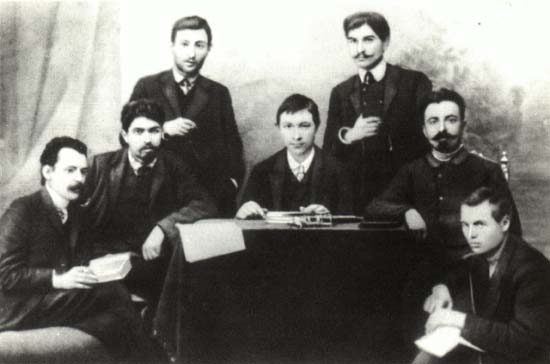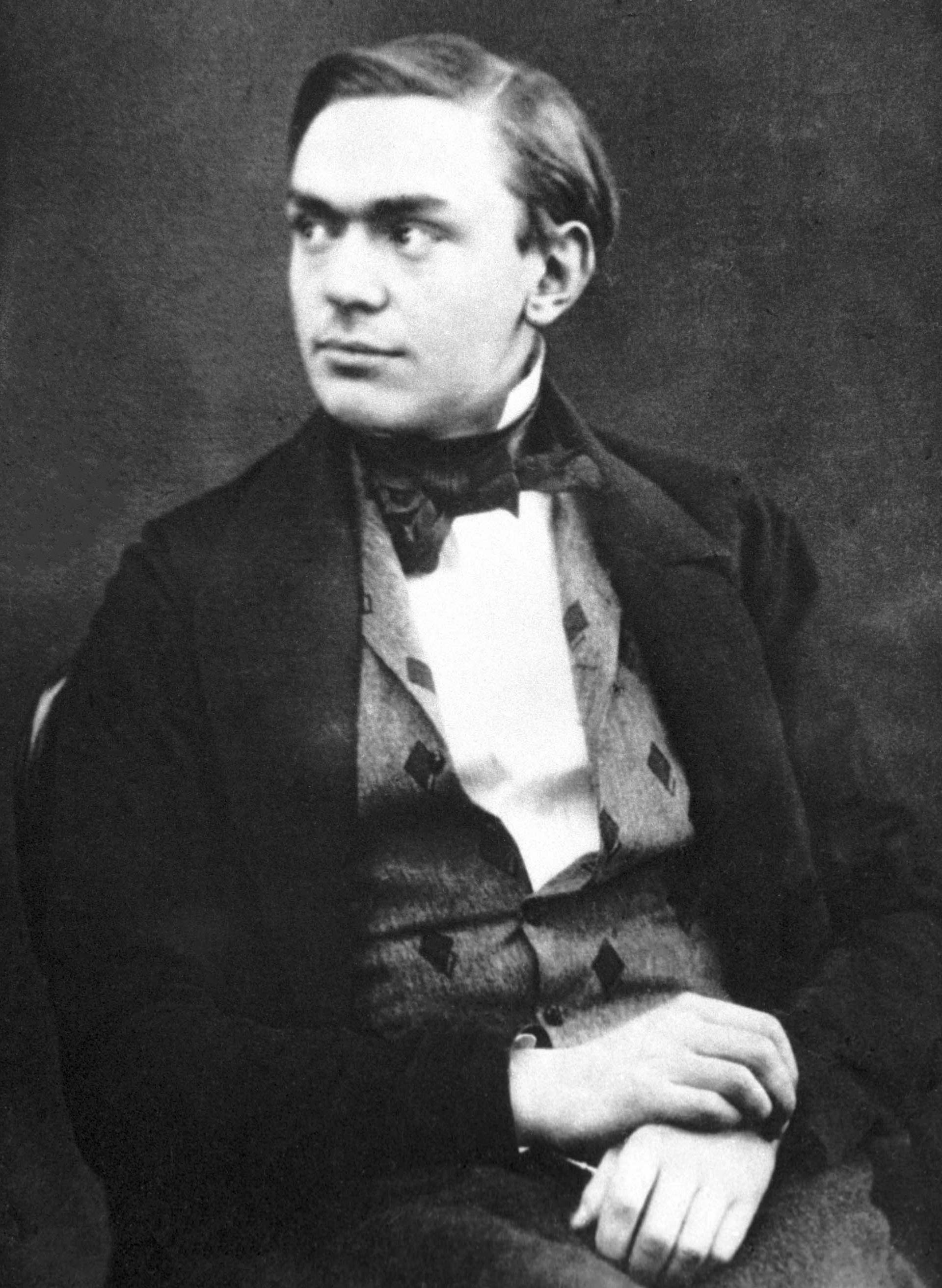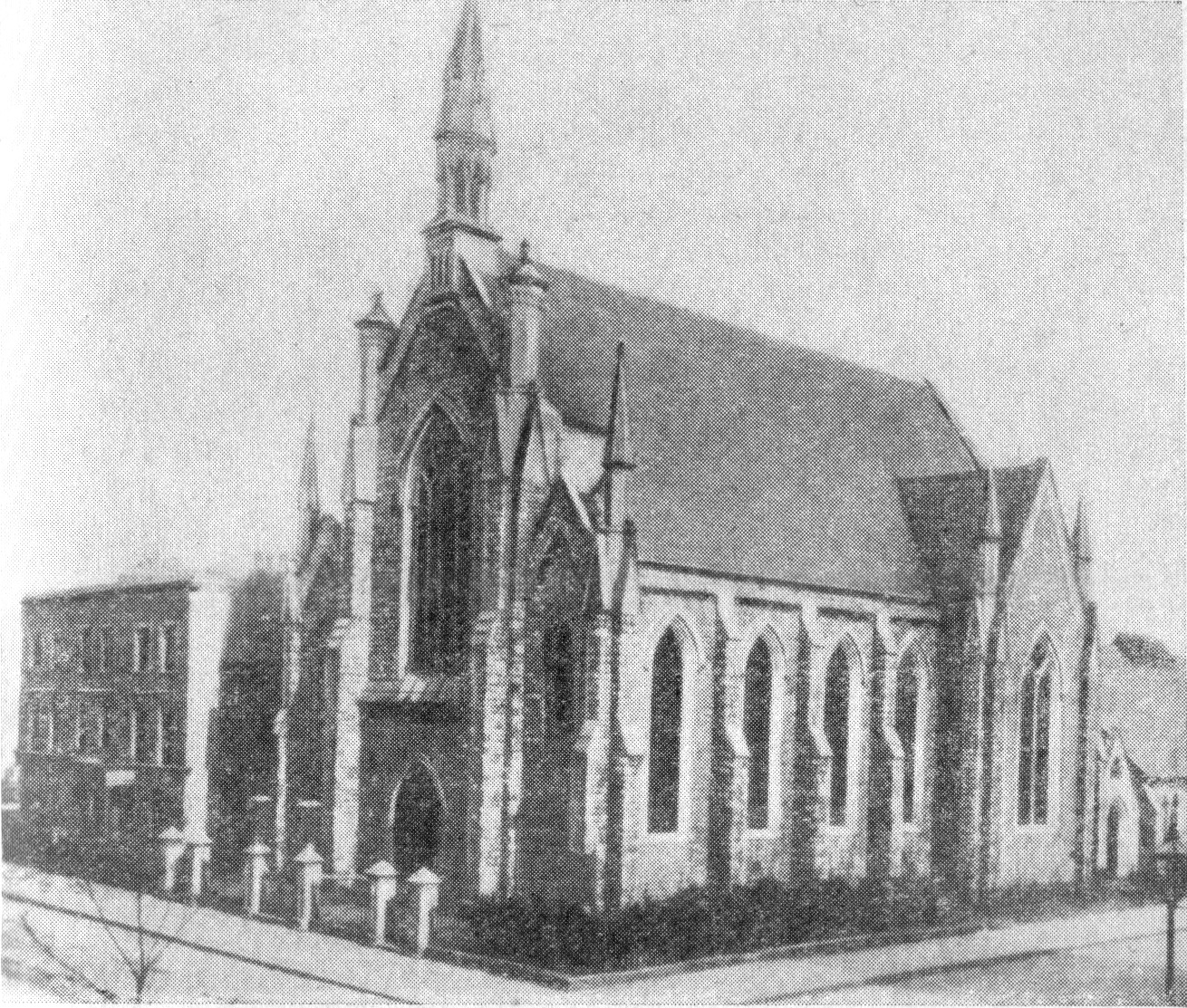|
Martyn Liadov
Martyn Nikolaevich Liadov, ( Russian: Мартын Николаевичч Лядов) pseudonym of Martyn Nikolaevich Mandel’shtam (24 August 1872 – 6 January 1947), was a Bolshevik revolutionary activist and historian. Biography Liadov was born in Moscow on 12 August Old Style 1872, the son of a prominent obstetrician and gynecologist, Nikolai Martynovich (Nokhim Mendelevich) Mandelstam. He was expelled from school at around the age of 12, and was sent by his parents to live with his wealthy uncle in Mitau (Jelgava), in modern-day Latvia, where he enrolled at a German language school. His parents both died while he was at school. In 1889, he was barred from graduating after taking part in protests against the forced russification of German schools. He joined the Russian army as a volunteer, and in 1891 he was transferred to the reserves as a junior officer, and returned to Moscow. Liadov was first drawn to the populist Narodnik movement in Moscow in 1891, but by 1893, he h ... [...More Info...] [...Related Items...] OR: [Wikipedia] [Google] [Baidu] |
Lyadov MN
Lyadov (russian: Лядов) is a Russian male surname, its feminine counterpart is Lyadova. It may refer to: *Anatoly Lyadov (1855–1914), Russian composer and conductor * Viktor Lyadov (born 1966), Russian pianist * Yury Lyadov (born 1987), Belarusian Olympic biathlon competitor *Elena Lyadova (born 1980), Russian actress *Lyubov Lyadova Lyubov Lyadova (born 17 November 1952) is a former Soviet cross-country skier who competed during the early 1980s. She won a silver medal in the 4 × 5 km relay at the 1982 FIS Nordic World Ski Championships in Oslo and finished fourth in t ... (born 1952), Russian cross-country skier * Lyudmila Lyadova (1925–2021), Russian composer {{surname Russian-language surnames ... [...More Info...] [...Related Items...] OR: [Wikipedia] [Google] [Baidu] |
Central Committee Of The Communist Party Of The Soviet Union
The Central Committee of the Communist Party of the Soviet Union, – TsK KPSS was the executive leadership of the Communist Party of the Soviet Union, acting between sessions of Congress. According to party statutes, the committee directed all party and governmental activities. Its members were elected by the Party Congress. During Vladimir Lenin's leadership of the Communist Party, the Central Committee functioned as the highest party authority between Congresses. However, in the following decades the ''de facto'' most powerful decision-making body would oscillate back and forth between the Central Committee and the Political Bureau or Politburo (and during Joseph Stalin, the Secretariat). Some committee delegates objected to the re-establishment of the Politburo in 1919, and in response, the Politburo became organizationally responsible to the Central Committee. Subsequently, the Central Committee members could participate in Politburo sessions with a consultative voi ... [...More Info...] [...Related Items...] OR: [Wikipedia] [Google] [Baidu] |
Supreme Soviet Of The National Economy
Supreme Board of the National Economy, Superior Board of the People's Economy, (Высший совет народного хозяйства, ВСНХ, ''Vysshiy sovet narodnogo khozyaystva'', VSNKh) was the superior state institution for management of the economy of the RSFSR and later of the Soviet Union. There were two institutions with this name, at different times, 1917–1932 and 1963–1965. 1917–1932 The VSNKh of the first period was the supreme organ of the management of the economy, mainly of the industry. Foundation The VSNKh was launched on December 5, 1917 through a decree of the Council of People's Commissars (Sovnarkom) and All-Russian Central Executive Committee of Soviets of the Russian Socialist Federative Soviet Republic.Alec Nove, ''An Economic History of the USSR.'' New Edition. London: Penguin Books, 1989; pg. 42. Its stated purpose was to "plan for the organization of the economic life of the country and the financial resources of the government". It wa ... [...More Info...] [...Related Items...] OR: [Wikipedia] [Google] [Baidu] |
Georgia (country)
Georgia (, ; ) is a transcontinental country at the intersection of Eastern Europe and Western Asia. It is part of the Caucasus region, bounded by the Black Sea to the west, by Russia to the north and northeast, by Turkey to the southwest, by Armenia to the south, and by Azerbaijan to the southeast. The country covers an area of , and has a population of 3.7 million people. Tbilisi is its capital as well as its largest city, home to roughly a third of the Georgian population. During the classical era, several independent kingdoms became established in what is now Georgia, such as Colchis and Iberia. In the early 4th century, ethnic Georgians officially adopted Christianity, which contributed to the spiritual and political unification of the early Georgian states. In the Middle Ages, the unified Kingdom of Georgia emerged and reached its Golden Age during the reign of King David IV and Queen Tamar in the 12th and early 13th centuries. Thereafter, the kingdom d ... [...More Info...] [...Related Items...] OR: [Wikipedia] [Google] [Baidu] |
Stepan Shaumian
Stepan Georgevich Shaumian (; , ''Step’an Ge'vorgi Shahumyan''; 1 October 1878 – 20 September 1918) was a Bolshevik revolutionary and politician active throughout the Caucasus. Arzumanyan, M. Շահումյան, Ստեփան Գևորգի. "Yerevan, Armenian SSR, vol. viii", ''The Soviet Armenian Encyclopedia'', 1982, pp. 431–34 Shahumyan was an ethnic Armenian and his role as a leader of the Russian revolution in the Caucasus earned him the nickname of the "Caucasian Lenin", a reference to the leader of the Russian Revolution, Vladimir Lenin. The founder and editor of several newspapers and journals, Shaumian is best known as the head of the Baku Commune, a short lived committee appointed by Lenin in March 1918 with the task of leading the revolution in the Caucasus and West Asia. His tenure as leader of the Baku Commune was marred with numerous problems including ethnic violence between Baku's Armenian and Azerbaijani populations, attempting to defend the city against a ... [...More Info...] [...Related Items...] OR: [Wikipedia] [Google] [Baidu] |
Baku Commune
Baku (, ; az, Bakı ) is the capital and largest city of Azerbaijan, as well as the largest city on the Caspian Sea and of the Caucasus region. Baku is located below sea level, which makes it the lowest lying national capital in the world and also the largest city in the world located below sea level. Baku lies on the southern shore of the Absheron Peninsula, alongside the Bay of Baku. Baku's urban population was estimated at two million people as of 2009. Baku is the primate city of Azerbaijan—it is the sole metropolis in the country, and about 25% of all inhabitants of the country live in Baku's metropolitan area. Baku is divided into twelve administrative raions and 48 townships. Among these are the townships on the islands of the Baku Archipelago, and the town of Oil Rocks built on stilts in the Caspian Sea, away from Baku. The Inner City of Baku, along with the Shirvanshah's Palace and Maiden Tower, were inscribed as a UNESCO World Heritage Site in 2000. The ci ... [...More Info...] [...Related Items...] OR: [Wikipedia] [Google] [Baidu] |
February Revolution
The February Revolution ( rus, Февра́льская револю́ция, r=Fevral'skaya revolyutsiya, p=fʲɪvˈralʲskəjə rʲɪvɐˈlʲutsɨjə), known in Soviet historiography as the February Bourgeois Democratic Revolution and sometimes as the March Revolution, was the first of two revolutions which took place in Russia in 1917. The main events of the revolution took place in and near Petrograd (present-day Saint Petersburg), the then-capital of Russia, where long-standing discontent with the monarchy erupted into mass protests against food rationing on 23 February Old Style (8 March New Style). Revolutionary activity lasted about eight days, involving mass demonstrations and violent armed clashes with police and gendarmes, the last loyal forces of the Russian monarchy. On 27 February O.S. (12 March N.S.) the forces of the capital's garrison sided with the revolutionaries. Three days later Tsar Nicholas II abdicated, ending Romanov dynastic rule and the Russia ... [...More Info...] [...Related Items...] OR: [Wikipedia] [Google] [Baidu] |
Alfred Nobel
Alfred Bernhard Nobel ( , ; 21 October 1833 – 10 December 1896) was a Swedish chemist, engineer, inventor, businessman, and philanthropist. He is best known for having bequeathed his fortune to establish the Nobel Prize, though he also made several important contributions to science, holding 355 patents in his lifetime. Nobel's most famous invention was dynamite, a safer and easier means of harnessing the explosive power of nitroglycerin; it was patented in 1867. Nobel displayed an early aptitude for science and learning, particularly in chemistry and languages; he became fluent in six languages and filed his first patent at age 24. He embarked on many business ventures with his family, most notably owning Bofors, an iron and steel producer that he developed into a major manufacturer of cannons and other armaments. Nobel was later inspired to donate his fortune to the Nobel Prize institution, which would annually recognize those who "conferred the greatest benefit ... [...More Info...] [...Related Items...] OR: [Wikipedia] [Google] [Baidu] |
Alexander Bogdanov
Alexander Aleksandrovich Bogdanov (russian: Алекса́ндр Алекса́ндрович Богда́нов; – 7 April 1928), born Alexander Malinovsky, was a Russian and later Soviet physician, philosopher, science fiction writer, and Bolshevik revolutionary. He was a key figure in the early history of the Russian Social Democratic Labor Party (later the Communist Party of the Soviet Union), originally established 1898, and of its Bolshevik faction. Bogdanov co-founded the Bolsheviks in 1903, when they split with the Menshevik faction. He was a rival within the Bolsheviks to Vladimir Lenin (1870–1924), until being expelled in 1909 and founding his own faction Vpered. Following the Russian Revolutions of 1917, when the Bolsheviks came to power in the collapsing Russian Republic, during the first decade of the subsequent Soviet Union in the 1920s, he was an influential opponent of the Bolshevik government and Lenin from a Marxist leftist perspective. Bogdanov r ... [...More Info...] [...Related Items...] OR: [Wikipedia] [Google] [Baidu] |
Otzovist
In the course of the history of the RSDLP ( Russian Social Democratic Labour Party between 1898 and 1918), several political factions developed, as well as the major split between the Bolsheviks and the Mensheviks. * Bolsheviks formed in 1903 from the major split in the RSDLP which also produced the Mensheviks. The Bolshevik faction followed Vladimir Lenin, and organised a separate party, the Russian Social Democratic Workers Party, aka Russian Social Democratic Labour Party (Bolsheviks), in 1912. After the October Revolution of November 1917 it became the Russian Communist Party (Bolsheviks). * Mensheviks formed from the 1903 split with the Bolsheviks; the Mensheviks followed Julius Martov. With the formal severing of ties in 1912, the Mensheviks used the name Russian Social Democratic Party (Mensheviks), or sometimes without the qualifier. At the outbreak of World War I in 1914, the majority supporting the war ("Defencists") maintained control of the RSDLP(M) under Fyodor Da ... [...More Info...] [...Related Items...] OR: [Wikipedia] [Google] [Baidu] |
5th Congress Of The Russian Social Democratic Labour Party
The 5th Congress of the Russian Social Democratic Labour Party was held in London between May 13 and June 1, 1907. The 5th Congress had the largest attendance of the Congresses of the unified RSDLP.Thatcher, Ian D. Trotsky'. Routledge Historical Biographies. London: Routledge, 2003. p. 49 Thirty-five sessions of the Congress were held in the Brotherhood Church in Hackney, during which stormy debates took place. Service, Robert. Stalin: A Biography'. Cambridge, Massachusetts: Belknap Press of Harvard University Press, 2005. p. 65 Delegations 338 delegates attended the Congress. There were: * 105 Bolshevik delegates, representing 33,000 members * 97 Menshevik delegates representing 43,000 members * 59 Bundist delegates representing 33,000 members * 44 Polish Social Democrat (SDKPiL) delegates, representing 28,000 members * 29 Latvian Social Democrat delegates, representing 13,000 members * 4 'non-faction' delegates 300 of the delegates had voting rights.Minczeles, Henri. ''Hist ... [...More Info...] [...Related Items...] OR: [Wikipedia] [Google] [Baidu] |
4th Congress Of The Russian Social Democratic Labour Party
The Fourth (Unity) Congress of the Russian Social Democratic Labour Party that took place in (old) Folkets hus, Stockholm, Sweden, from 10-25 April (23 April to 8 May), 1906. The Congress was attended by 112 delegates with the right to vote, who represented 57 local Party organisations and 22 delegates with voice but no vote. Other participants were delegates from various national Social-Democratic parties: three each from the Social-Democrats of Poland and Lithuania, the Bund and the Lettish Social Democratic Labour Party, one each from the Ukrainian Social-Democratic Labour Party and the Finnish Labour Party, and also a representative of the Social Democratic Labour Party of Bulgaria. Among the Bolshevik delegates were Vladimir Lenin, Alexander Bogdanov, Leonid Krassin, Mikhail Frunze, Mikhail Kalinin, Nadezhda Konstantinovna Krupskaya, Anatoly Lunacharsky, Fyodor Sergeyev (Artyom), S. G. Shaumyan, Ivan Skvortsov-Stepanov, Joseph Stalin, Kliment Voroshilov, Maxim Litvinov ... [...More Info...] [...Related Items...] OR: [Wikipedia] [Google] [Baidu] |





